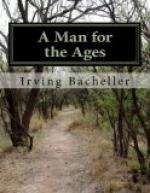The two men went across to the tavern. Mrs. Rutledge and Abe tiptoed up the stairway. The latter entered the room of the sick girl. The woman closed the door. Ann Rutledge was alone with her lover. There were none who knew what happened in that solemn hour save the two—one of whom was on the edge of eternity, and the other was never to speak of it. The only record of that hour is to be found in the face and spirit of a great man.
Years later Samson wrote in a letter.
* * * * *
“I saw Abe when he came out of the tavern that day. He was not the Abe we had all known. He was different. There were new lines in his face. It was sorrowful. His steps were slow. He had passed out of his young manhood. When I spoke to him, he answered with that gentle dignity now so familiar to all who know him. From that hour he was Abraham Lincoln.”
* * * * *
Ann passed away before the month ended and became, like many of her kind, an imperishable memory. In her presence the spirit of the young man had received such a baptism that henceforward, taking thought of her, he was to love purity and all cleanness, and no Mary who came to his feet with tears and ointment was ever to be turned away.
CHAPTER XVI
WHEREIN YOUNG MR. LINCOLN SAFELY PASSES TWO GREAT DANGER POINTS AND TURNS INTO THE HIGHWAY OF HIS MANHOOD.
For days thereafter the people of New Salem were sorely troubled. Abe Lincoln, the ready helper in time of need, the wise counselor, the friend of all—“old and young, dogs and horses,” as Samson was wont to say—the pride and hope of the little cabin village, was breaking down under his grief. He seemed to care no more for work or study or friendship. He wandered out in the woods and upon the prairies alone. Many feared that he would lose his reason.
There was a wise and merry-hearted man who lived a mile or so from the village. His name was Bowlin Green. Every one on Salem Hill and in the country round about it laid claim to the friendship of this remarkable man. Those days when one of middle age had established himself in the affections of a community, its members had a way of adopting him. So Mr. Green had been adopted into many families from Beardstown to Springfield. He was everybody’s “Uncle Bowlin.” He had a most unusual circumference and the strength to carry it. He was indeed a man of extended boundaries, embracing noble gifts, the best of which was good nature. His jests, his loud laughter and his quaking circumference were the three outstanding factors in his popularity. The loss of either would have been a misfortune to himself and neighbors. His ruddy cheeks and curling locks and kindly dark eyes and large head were details of importance. Under all were a heart with the love of men, a mind of unusual understanding and a hand skilled in all the arts of the Kentucky pioneer. He could grill a venison steak and roast a grouse and broil a chicken in a way which had filled the countryside with fond recollections of his hospitality; he could kindle a fire with a bow and string, a pine stick and some shavings; he could make anything from a splint broom to a rocking horse with his jack-knife. Abe Lincoln was one of the many men who knew and loved him.




